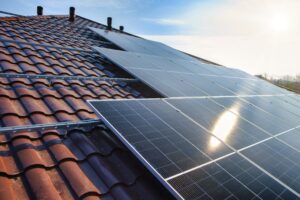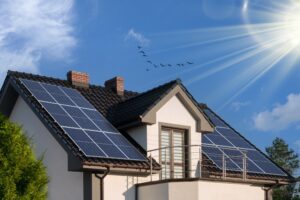Powering your home with solar panels cuts energy bills, reduces your carbon footprint, and can increase the value of your property. It also gives you the opportunity of making a small income by selling electricity generated back to the National Grid.
More than 1.3 million UK homes now have solar panels. Energy experts estimate that solar energy systems will account for up to 20% of the country’s total electricity generation by 2030.
If you’re considering a solar power system, you can find out here all about the advantages of having solar panels installed. Knowing how solar panels work and their benefits provides an insight into why residential solar energy systems are more than worthy of consideration.
How Do Solar Panels Work?
Energy from the sun provides an infinite source of renewable energy with no greenhouse gas emissions.
Solar photovoltaic (PV) panels turn this energy into a direct current (DC) of electricity. An inverter then creates the alternating current (AC) that powers home electrical systems.
PV cells in solar panels are made from a semiconductor material, usually silicon, the same material used in microelectronics.
These cells are placed within a metal panel frame encased with glass. When exposed to small packets of energy from the sun – photons – they produce an electric charge by releasing electrons.
For optimal functionality, solar panels need direct sunlight but they also work in partial shade and on cloudy days, although producing less power.
Installing rooftop solar panels, including putting up scaffolding, generally takes just a day.
- Create a Tailored Quote Based On Your Circumstances
- Takes Less Than 2 Minutes
- Fixed-Online Quotes

How Solar Panels Cut Energy Bills
Most householders are inevitably looking to save money on energy, and an increasing number are switching to renewable energy sources such as solar. Solar panels generate electricity from an abundant and free source – the sun. Once your solar energy system is installed, you’ll be producing your own electricity and using less from the National Grid, which means lower energy bills.
Solar panels can reduce home electricity bills by up to 70% according to the Energy Saving Trust.
Combine them with a solar battery storage system, and that figure may rise to up to 90%. This could give you enough renewable energy production during the summer so you don’t have to use any electricity from the grid.
Furthermore, solar panels are a sound long-term investment. Most come with warranties of 20 to 25 years, and many last much longer than that with basic maintenance – washing down with a hose a few times a year to clean off any dirt and dust not removed by rainfall.
How much money you’ll save by using solar power depends on factors such as the amount of energy you use, the size of your solar system, and whether you combine it with solar energy storage.
How Solar Panels Reduce Your Carbon Footprint
Solar panels provide a clean, green alternative to carbon fuels. The sun is a powerful renewable energy source that, unlike fossil fuels, isn’t expected to run out until around five billion years from now. That, according to scientists, is when the sun will die.
With no greenhouse gases and a minimal carbon footprint, renewable energy produced by solar panels makes a positive impact on the environment. It lessens dependence on traditional carbon-based fuels – oil, coal, and natural gas – that pollute the air and release toxic emissions that drive climate change.
Researchers at Harvard University in America, found that fossil fuel pollution killed more than eight million people in 2018, accounting for 20% of deaths worldwide.
Greenhouse gases cause global warming by trapping heat in the atmosphere. The World Meteorological Organization (WMO) predicts that global temperatures are likely to hit record levels in the next five years.
A further disadvantage of fossil fuels is that they’re likely to become increasingly costly in the future as reserves dwindle.
How Solar Panels Increase Home Value
Solar panels may not have a lot of visual appeal when it comes to selling your home but they offer significant solar energy advantages that their presence is highly unlikely to detract from a property’s value. In fact, studies have shown that solar power systems can increase the value of your home and help you sell it faster.
Properties with solar panels can sell for as much as 20 to 25% more than comparable homes without them, according to some estimates. Eco-conscious homebuyers will find your solar-powered home more appealing because solar panels increase energy performance certificate (EPC) ratings for a property.
If you have a solar panel system registered with the SEG initiative, you can point out that anyone buying your home will be able to get these payments for any excess electricity produced too.
Selling Your Electricity Back to the Grid
If your solar panels generate more electricity than you use, you can sell it back to the National Grid. Under the Smart Export Guarantee (SEG), licensed electricity suppliers pay tariffs for excess solar energy.
SEG was launched by the government in 2020. In most cases, the scheme pays higher rates than the Feed-in Tariff (FiT) it replaced.
To qualify for SEG payments, you need an export meter or a smart meter, and your solar panels must have been installed by professionals. Once registered, you’ll get paid for each unit of electricity you feed back to the grid.
Tariffs can be fixed or variable and range from 2p to 15p per kilowatt hour (kWh) – a small but regular stream of income.
An increasing number of households with solar panels are benefiting from the SEG initiative.
According to Ofgem (the Office of Gas and Electricity Markets), which administers the scheme, nearly 93,000 renewable energy sources were registered for SEG payments during the 12 months up to March 2023 – almost 59,000 more than the previous year.
SEG payments for 2022-23 totalled more than £7 million, compared with £1.6 million the previous year.
Almost all low-carbon energy covered in the SEG scheme – 99.9% – is generated by solar power.
How to Maximise the Advantages of Solar Panels
Ways to get the most from your solar panels include battery storage and energy efficiency measures.
Solar Batteries
Solar energy goes back to the National Grid unless used immediately. Solar panels produce most power in daylight, when we typically use less of it. During the evenings, when energy use tends to peak, they provide little or no power.
Solar batteries store solar energy that you can use when you need it most during the hours of darkness. This can lower electricity costs by up to 90% by reducing reliance on the grid. You may also be able to sell stored energy you don’t use back to the grid under the SEG initiative.
Solar batteries last up to 20 years, reducing environmental impact and cutting energy bills. A wall-mounted or floor-standing solar battery can be installed inside or outside the home, as long as it’s reasonably near the electrical consumer unit.
- Create a Tailored Quote Based On Your Circumstances
- Takes Less Than 2 Minutes
- Fixed-Online Quotes

Energy Efficiency
The energy produced by your solar panels will go much further if you can reduce the amount of power you need through home energy efficiency measures.
Common measures to reduce energy demand include:
- Cavity wall insulation and loft insulation.
- Installing an energy-efficient boiler.
- Dialling down your boiler’s flow temperature to between 50C and 60C.
- Installing an air-source heat pump.
- Replacing old appliances with energy-efficient models.
- Using radiator thermostat valves to control heating room by room.
- Fitting an energy-efficient shower head.
- Taking shorter showers.
- Setting your washing machine to a lower temperature.
- Reducing use of a tumble dryer.
- Switching off appliances at the socket when not being used.
- Using LED (light-emitting diode) lightbulbs.
- Making more use of the microwave if you have an electric oven.
- Draught-proofing windows and doors.
- Replacing old windows with double glazing.
- Getting a smart meter to help manage energy use and costs.
How Much Do Solar Panels Cost?
Solar energy has developed over the past 10 years as a popular solution to power homes, and solar panels are now more affordable than ever.
As electricity prices have soared in recent years, the cost of going solar has fallen substantially – by 82% since 2010.
Average solar panel installation costs for 2023 are:
- One-bedroom home (three panels) – £2,358.
- Two-bed home (six panels) – £4,716.
- Three-bed home (10 panels) – £7,860.
- Four-bed home (14 panels) – £11,005.
Solar Panel Payback
Energy savings typically start to exceed the cost of solar panel installation after 10 years or sooner.
Solar panels can last at least 15 years after the break-even point, saving families thousands of pounds.
If you decide to move home, you can’t take your solar panels with you, but they could help you get a better selling price that will at least recoup the cost of installing them.
Effective Home Solar Energy Solutions
Effective Home has been installing solar panels and solar batteries in homes across the UK for more than 15 years.
We’ve helped thousands of families enjoy the advantages of solar systems, from saving money and electricity bill reductions to reducing carbon footprints and adding value to their home.
Contact us to schedule a free site survey and customised solar energy installation plan for your home. We can also arrange financing so you can spread the cost of your solar panels or solar battery.
- Create a Tailored Quote Based On Your Circumstances
- Takes Less Than 2 Minutes
- Fixed-Online Quotes




